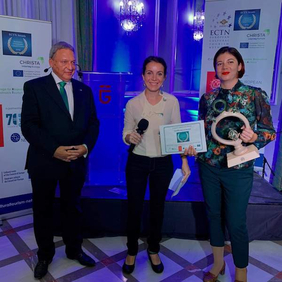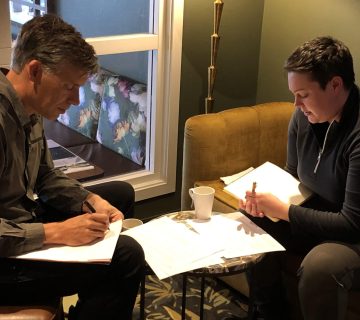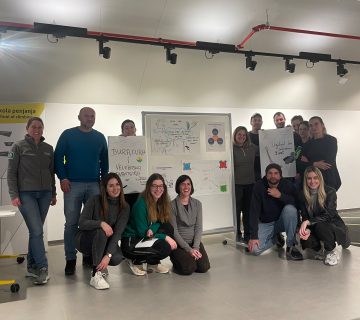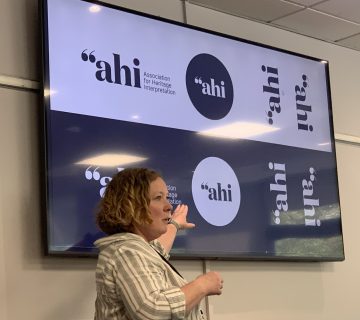The 12th ECTN (European Cultural Tourism Network) conference, Culture and Heritage for Responsible, Innovative and Sustainable Tourism Actions’, was held in Granada, Spain, and as IE’s Tourism Coordinator, I was proud to represent IE in my home country.
It was the closing conference of the CHRISTA Project (Culture and Heritage for Responsible, Innovative and Sustainable Tourism Actions) and the main outputs were channelled in the form of action plans within nine regions across Europe. The implementation and monitoring of improved policy, dissemitation tools for policy learning and capacity building is a contribution to the EU policies and EU2020 targets. The expected changes in destination regions, as well as advances in relevant policy implementation and the upgrading of cultural and natural assests, were set out during the first day of the dissemination event.
During the opening session, Anne Grady, Principal Officer European Commission Directorate General Education and Culture, delivered a keynote address and pointed out the need for an inclusive Europe through cultural heritage, participation and access for all, and the concept of Sustainable Cultural Tourism. Thus in the words of CHRISTA Project Coordinator, Manos Vougioukas: ‘Although being about cultural heritage, half of the key findings have a direct or indirect reference to cultural tourism. That means that cultural heritage counts for tourism and thus we should bear this in mind in practice’.
After that, four stakeholders from different countries presented the main results of the CHRISTA Project under the ‘4 I’ themes: Intangible heritage; Industrial heritage; heritage Interpretation; and Innovation and digitisation. This was followed by a policy makers’ panel discussion and then the first day ended with a conference dinner and the award ceremony for ‘Destination of Sustaianble Cultural Tourism 2019 ECTN’ in partnership with Europa Nostra, European Travel Commission and NECSTouR, supported by Iter Vitis Cultural Route of the Council of Europe.
The following day, I moderated the parallel session focused on heritage interpretation.
Granada County shared the policy implementation and all milestones reached – an example of how the CHRISTA Project can be a useful network with practical tools to change local policy and develop rural communities through adding value to heritage. Eriberto Eulisse from Italy talked about the Water Museum of Venice and how to educate and engage larger audiences creating emotional bonds using heritage interpretation. ‘Read a Poem not a Post’ was the motto of the innovative approach to young community engagement from Burgas, Bulgaria – another way of making heritage interpretation in a city, growing awareness amongst young people. Last, but not least, Andreas Bonde from the University College Absalon in Denmark approached ‘The seven pillars in a good heritage experience’ and how they can inspire more sustainable heritage interpretation development.
Interpret Europe took a turn again during the closing session with a short presentation about our organisation and a demonstration within the venue as a way to further explain and help the audience connect with IE and aid their understanding of heritage interpretation. Attendees found the hidden meaning under a specific object: an earthenware water pitcher very typical from southern Spain. They agreed on the fact that appropiate techniques facilitate connections and visitor interest, and therefore reach excellence in visitor experiences and heritage engagement. I ended up making a call on the need of truly connecting culture, heritage and sustainable tourism, and suggested that we have the know-how on how to include heritage interpretation in our tourism destination strategic plans and training programmes for the tourism and hospitality sector as an indicator of the so called ‘quality in tourism’.
Nuria Mohedano is IE’s Tourism Coordinator and is based in Puertolllano, Castilla-La Universitet in Denmark. She currently combines teaching in non-formal education tourism related courses and freelance work as a sustainable tourism marketing consultant. She can be contacted at: nuria.mohedano@interpret-europe.net.
To cite this article:
Mohedano, Nuria (2019) ‘Culture and heritage for responsible, innovative and sustainable tourism actions’. In Interpret Europe Newsletter 4-2019, 7.
Available online: www.interpret-europe.net/fileadmin/Documents/publications/Newsletters/ie-newsletter_2019-4_winter.pdf




